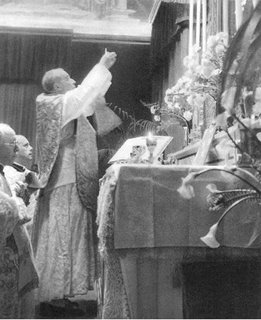
- E senti o espírito
 inundado por um mistério de luz que é Deus e N´Ele vi e ouvi -A ponta da lança como chama que se desprende, toca o eixo da terra, – Ela estremece: montanhas, cidades, vilas e aldeias com os seus moradores são sepultados. - O mar, os rios e as nuvens saem dos seus limites, transbordam, inundam e arrastam consigo num redemoinho, moradias e gente em número que não se pode contar , é a purificação do mundo pelo pecado em que se mergulha. - O ódio, a ambição provocam a guerra destruidora! - Depois senti no palpitar acelerado do coração e no meu espírito o eco duma voz suave que dizia: – No tempo, uma só Fé, um só Batismo, uma só Igreja, Santa, Católica, Apostólica: - Na eternidade, o Céu! (escreve a irmã Lúcia a 3 de janeiro de 1944, em "O Meu Caminho," I, p. 158 – 160 – Carmelo de Coimbra)
inundado por um mistério de luz que é Deus e N´Ele vi e ouvi -A ponta da lança como chama que se desprende, toca o eixo da terra, – Ela estremece: montanhas, cidades, vilas e aldeias com os seus moradores são sepultados. - O mar, os rios e as nuvens saem dos seus limites, transbordam, inundam e arrastam consigo num redemoinho, moradias e gente em número que não se pode contar , é a purificação do mundo pelo pecado em que se mergulha. - O ódio, a ambição provocam a guerra destruidora! - Depois senti no palpitar acelerado do coração e no meu espírito o eco duma voz suave que dizia: – No tempo, uma só Fé, um só Batismo, uma só Igreja, Santa, Católica, Apostólica: - Na eternidade, o Céu! (escreve a irmã Lúcia a 3 de janeiro de 1944, em "O Meu Caminho," I, p. 158 – 160 – Carmelo de Coimbra)
quinta-feira, 31 de dezembro de 2009
A Visual Tribute to the Pastor Angélicus
The Great Pope Pius XII
O.K. dear bloggers, here are some more pictures of the great Pope Pius XII!
-Some (and more) of these pictures can be found here:
http://hallowedground.wordpress.com/
††††† ††††† ††††† ††††† ††††† ††††† ††††† ††††† †††††
 This is a picture of Pius X's Canonization Mass: the Pope is venerating the relics of his saintly predecessor
This is a picture of Pius X's Canonization Mass: the Pope is venerating the relics of his saintly predecessor No comments needed!!!
No comments needed!!! Ordinations (wow!) - I am not sure where this took place, but according to a friend, it was somewhere in Spain after the Civil War
Ordinations (wow!) - I am not sure where this took place, but according to a friend, it was somewhere in Spain after the Civil WarIf you have 1 hour and 24 seconds and you enjoy watching clips of Pope Pius XII, then I recommend you watch this video: Pastor Angélicus (Click on link).

The video is about the life and pontificate of Pius XII - It is completely in Italian, but you get to see a lot of things that we do not get to see today.



"Nothing could better obstruct the confrontation of man with God than the notion that we 'go unto the altar of God' as we would go to a pleasant, relaxing social gathering. This is why the Latin mass with Gregorian chant, which raises us up to a sacred atmosphere, is vastly superior to a vernacular mass with popular songs, which leaves us in a profane, merely natural atmosphere."
-Dietrich von Hildebrand
"Dietrich von Hildebrand is the 20th century Doctor of the Church."
-Pope Pius XII
FONTE:society that thinks Pope Pius XII rules
A Visual Tribute to the Pastor Angélicus
This is for all those who admire and defend Pius XII!
 Cardinal Pacelli at Eucharistic Congress in Budapest
Cardinal Pacelli at Eucharistic Congress in Budapest

"Nothing could better obstruct the confrontation of man with God than the notion that we 'go unto the altar of God' as we would go to a pleasant, relaxing social gathering. This is why the Latin mass with Gregorian chant, which raises us up to a sacred atmosphere, is vastly superior to a vernacular mass with popular songs, which leaves us in a profane, merely natural atmosphere."
-Dietrich von Hildebrand
"Dietrich von Hildebrand is the 20th century Doctor of the Church."
-Pope Pius XII
FONTE:society that thinks Pope Pius XII rules
Assinar:
Comentários (Atom)











